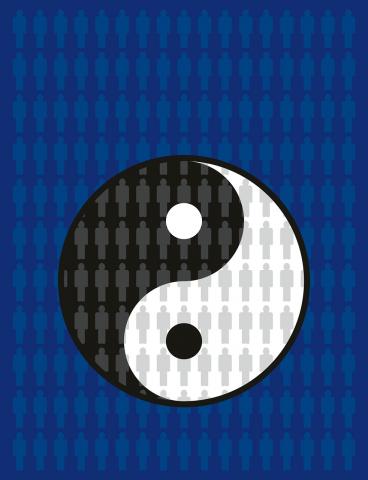 Submitted by Kartr on
Submitted by Kartr on

“There is the Karma of merit and the Karma of demerit. Karma neither punishes nor rewards, it is simply the one Universal LAW which guides unerringly, and, so to say, blindly, all other laws productive of certain effects along the grooves of their respective causations. When Buddhism teaches that “Karma is that moral kernel (of any being) which alone survives death and continues in transmigration” or reincarnation, it simply means that there remains nought after each Personality but the causes produced by it; causes which are undying, i.e., which cannot be eliminated from the Universe until replaced by their legitimate effects, and wiped out by them, so to speak, and such causes – unless compensated during the life of the person who produced them with adequate effects, will follow the reincarnated Ego, and reach it in its subsequent reincarnation until a harmony between effects and causes is fully re-established.”
There are many people who say, “This teaching about Karma sounds so strict and unloving. It’s like the “eye for an eye and a tooth for a tooth” of the Old Testament. If there really is such a thing as the Law of Karma, then it must surely be compassionate and merciful and not cold, heartless, and punitive.”
In other words, they don’t really believe in the value and virtue of perfect justice and would prefer it if themselves and others could be able to get away with their bad deeds and unwise actions with just a light slap on the wrist or perhaps not even that. This mindset is largely found amongst those from a Christian background and is totally foreign to the Buddhist or Hindu way of thinking. The Christian, brought up with the absurd and illogical belief in a personal, anthropomorphic God with human-like sentiments and emotions, and the possibility of escaping and eternally evading the results and effects of one’s sins at an instant by saying “Forgive me, Lord!” or accepting Saint Anselm’s doctrine of vicarious atonement, feels that he or she is entitled to have cosmic justice stand aside and take a back seat.
But, as all life experience shows, things just don’t work that way.
The fact is that Karma is only “cold, heartless, and punitive” if we are. And even then, it is not Karma itself which can be described or viewed in such terms, since Karma is merely the impersonal and immutable Law inherent in the Universe which works incessantly to ensure the balance, harmony, and equilibrium of the Universe, by making perfect adjustment of effect to cause, reaction to action, and consequence to sequence. There’s no such thing as an effect without a cause, just as there is no cause without an effect.
“The law of Karma should not be regarded as a law of retaliation, because retaliation again infers the action of a being and not the working of law. Karma is the working out of effect from cause, as well as the creation of cause from which an effect must follow. Hence Karma is completely merciful, because justice and mercy in their highest aspect are one. The exact result must follow the cause, and from every act will flow many effects, both good and bad.”
Someone admirably remarked to us one day, “If I had the ability I would reprieve all those who have wronged or hurt me in any way from having to experience all the suffering and unpleasant effects which may result from their actions against me. I don’t want anyone to suffer, not even those who have caused me to suffer. So is it not the case that even I am more merciful and compassionate than the Law of Karma?”
In one sense, yes, since this attitude shows a true heartfelt compassion which is nothing less than divine. But three important things have to be borne in mind:
#1. If it was to ever happen that a cause could be set in motion without ever having its corresponding, correlative effect coming back to the point of origin – i.e. the cause-maker – then the whole Universe would immediately cease to be, since its very continuity and existence depends on this ever-acting Law of perfect balance and adjustment. If this could be overthrown in even one small case, everything would be instantaneously thrown into chaos.
#2. Karma, as is constantly reiterated, is a Law and has no resemblance or similarity to any type of being, entity, or personality, nor is it produced or invented by any Being or God. “KARMA is an Absolute and Eternal law in the World of manifestation; and as there can only be one Absolute, as One eternal and ever present Cause, believers in Karma cannot be regarded as Atheists or materialists – still less as fatalists: for Karma is one with the Unknowable, of which it is an aspect in its effects in the phenomenal world. … The ONE LIFE is closely related to the one law which governs the World of Being – KARMA. … To say to those ignorant of the real significance, characteristics and awful importance of this eternal and immutable law, that no theological definition of a personal deity can give an idea of this impersonal, yet ever present and active Principle, is to speak in vain.” (H.P. Blavatsky, “The Secret Doctrine” Vol. 2 p. 305-306, Vol. 1 p. 634) There is no Being behind Karma but Karma is behind all beings.
#3. We are not in a position, with our finite perception of things, to be able to judge or know what is best for the inner evolution or “soul evolution” of others. If we had the power, and exercised it, of reprieving others from having to face and experience their possibly painful and unpleasant Karma, we would be unwittingly robbing them of an important opportunity to learn, develop, and progress. Everything in life can be used and applied in this direction and everything in life is Karma, for nothing can ever happen outside of the Law of Karma, meaning that in reality there is actually no injustice but that all is exactly as we ourselves have made it to be.
We learn far more from and in our experiences of pain and suffering than we do from our experiences of pleasure and happiness. Our most valuable and enduring lessons are often learned as a result of deep suffering. Of course, this is not a popular concept today but it is the truth and has always been recognised as such in any spiritual philosophy worthy of the name.
“Misery, sorrow and suffering have a mission. It is usually only the misery we bring upon ourselves that makes us stop doing wrong, to look around and ask and see what is right. It is by our mistakes we learn to see the difference between right and wrong, and in seeing that difference is the whole story of progress. We have to be able to tell the difference. It is only through “the opposites” – the perception of them and the employment of them – that any being can grow at all. There has always to be duality in nature. All human beings are One in spirit, dual in expression. Always there is the actor and something to act upon. Always there are the two – Purusha, the spirit, and Prakriti, matter – not two separate things, but two aspects of one and the same thing. No perception is possible unless we have that duality. We have to experience darkness first in order to see light, and so with the opposites of pleasure and pain. Without pain we could not understand pleasure; without pleasure we could not understand pain. What lies behind all advance in intelligence, from the lowest to the highest, is perception gained by that which acts from that which is acted upon. – Robert Crosbie, “The Cause of Sorrow”
So, is Karma merciful and compassionate? The answer is that Karma is perfect Mercy itself. Karma is perfect Compassion itself. And this is because Karma is perfect Justice itself. If it was anything less than pure, perfect, exquisite Justice, it would not be merciful or compassionate. And why would we wish it to be anything less than perfectly just, both for ourselves and others? It always works for the highest good of all and this is what we should wish for all. The other attitude is the product of an understanding warped by unphilosophical religious dogmas which lead invariably to irresponsibility and moral decay.
https://blavatskytheosophy.com/is-karma-merciful-and-compassionate/
Originaly posted by LFN Member Dorje
- 704 reads